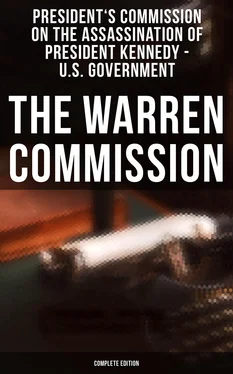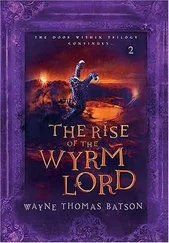So then the boy tried to fix it. And this is not a threat. My son is of this disposition, and he felt like he was a good marine. That I know. I would do the same. And I will read it now to Governor Connally: "I shall employ all means to right the gross mistake done to my family and my now dead son."
I expect to write to anybody officially to rectify this mistake.
I have shown this publicly at press conferences, and so I will employ all means to rectify this mistake—the mother of Lee Harvey Oswald. I intended to do that. That is my life's work.
I have the name of the man I talked to.
Chief Justice Warren—I will start from Lee as baby, before I get to this.
Lee was born October 18, 1939, in New Orleans, La. His mother, Marguerite Claverie Oswald, his father's name was Robert Edward Lee, he was named after General Lee. The family's name is Harvey—his grandmother's name was Harvey. And so he was named Lee Harvey Oswald.
Lee was born 2 months after the death of his father, who died from a heart attack, coronary thrombosis.
Lee was a very happy baby.
I stayed home with the children as long as I could, because I believe that a mother should be home with her children.
I don't want to get into my story, though.
Lee had a normal life as far as I, his mother, is concerned. He had a bicycle, he had everything that other children had.
Lee has wisdom without education. From a very small child—I have said this before, sir, and I have publicly stated this in 1959—Lee seemed to know the answers to things without schooling. That type child, in a way, is bored with schooling, because he is a little advanced.
Lee used to climb on top of the roof with binoculars, looking at the stars. He was reading astrology. Lee knew about any and every animal there was. He studied animals. All of their feeding habits, sleeping habits. He could converse—and that is why he was at the Bronx Zoo when he was picked up for truancy—he loved animals.
Lee played Monopoly. Lee played chess. Lee had a stamp collection, and even wrote to other young men and exchanged stamps, sir.
And Lee read history books, books too deep for a child his age. At age 9 he was always instructed not to contact me at work unless it was an emergency, because my work came first—he called me at work and said, "Mother, Queen Elizabeth's baby has been born."
He broke the rule to let me know that Queen Elizabeth's baby had been born. Nine years old. That was important to him. He liked things of that sort.
He loved comics, read comic books. He loved television programs. But most of all he loved the news on radio and television. If he was in the midst of a story, a film—he would turn it off for news. That was important.
And I have stated in 1959, which is in print, that Lee loved maps. Lee would study maps, sir. And he could tell you the distance from here and there. And when he was home on leave, I was amazed. Something was said about an airplane trip. Immediately he knew how many miles in the air that that plane took.
Lee read very, very important things. And any and everything he could do.
Yet he played Monopoly, played baseball.
He belonged to the "Y." He used to go swimming. He would come by work with his head wet, and I would say, "Hurry home, honey, you are going to catch cold."
And I considered that, sir, a very normal life.
I am probably forgetting some things.
So then Robert joined the Marines in 1956—am I correct—that Robert joined the Marines?
No, Robert joined the Marines in 1952. We are now in Fort Worth, Tex., until 1952.
So then I decided, since I was working, I did not want Lee to be alone. Up until this time, sir, he had a brother. So I sold my home at 7400 Ewing Street, and went to New York City, not as a venture, but because my older son, John Edward Pic, lived in New York, and had lived in New York for years. He was in the Coast Guard, as a military man. He has now been in the service 14 years, and at that time it would have been approximately 8 or 9 years—I may be off because that is approximately. So he was stationed in New York. So I had no problem of selling my home and going there, thinking that John Edward would leave New York.
But the main thing was to be where I had family. And I moved to New York for that reason.
Mr. Rankin. About what date was that?
Mrs. Oswald. This was exactly August 1952, because I wanted to get there in time for Lee's schooling. And if I am not mistaken, Robert joined the Marines in July of 1952. And that was my reason for going.
I immediately enrolled Lee in a Lutheran school, because Lee was not confirmed—he was baptized in the Lutheran faith, but because of moving around—I had married Mr. Ekdahl in this period and so on, Lee was not confirmed.
I enrolled him in the Lutheran school which took him approximately an hour or longer by subway to get there. It was quite a distance. That is when we first arrived in New York.
I believe that Lee was in that school a very short time, 2 or 3 weeks, because at this time I was living in my daughter-in-law's home and son. And we were not welcome, sir. We were welcome for a few days. But then we were to get a place of our own—because her mother lived with her, and her mother had left to go visit a sister. So Lee and I could come to visit. But we were not going to live with John and his wife.
So we just stayed there a short time.
Mr. Rankin. Was there any time that you recall that there was a threat of Lee Oswald against Mrs. Pic with a knife or anything like that?
Do you remember that?
Mrs. Oswald. Yes, I do. I am glad you said that.
My daughter-in-law was very upset. The very first time we went there—I stated before, and I am glad I said that—that we were not welcome. And immediately it was asked what did we plan to do, as soon as we put our foot in the house. And I had made it plain to John Edward that I was going to have a place of my own, that we were just coming there to get located.
My daughter-in-law resented the fact that her mother—this went on before I got there—that her mother had to leave the house and go visit a sister so I could come, John Edward's mother. I had never met my daughter-in-law. She didn't like me, and she didn't like Lee.
So she—what is the word to say—not picked on the child, but she showed her displeasure.
And she is a very—not, I would say so much an emotional person—but this girl is a New Yorker who was brought up in this particular neighborhood, which I believe is a poor section of New York.
The mother had lived in this home all her life. And this girl cursed like a trooper. She is—you cannot express it, Mr. Rankin—but not of a character of a high caliber.
At this particular time she had never been out of this neighborhood, or out of New York. And Lee loved the little baby. And he played with the baby and wanted to hold the baby and everything, which she objected.
We were not wanted, sir, from the very beginning. So there was, I think now—it was not a kitchen knife—it was a little pocket knife, a child's knife, that Lee had. So she hit Lee. So Lee had the knife—now, I remember this distinctly, because I remember how awful I thought Marjory was about this. Lee had the knife in his hand. He was whittling, because John Edward whittled ships and taught Lee to whittle ships. He puts them in the glass, you know. And he was whittling when this incident occurred. And that is what it occurred about, because there was scraps of the wood on the floor.
So when she attacked the child, he had the knife in hand. So she made the statement to my son that we had to leave, that Lee tried to use a knife on her.
Now, I say that is not true, gentlemen. You can be provoked into something. And because of the fact that he was whittling, and had the knife in his hand, they struggled.
Читать дальше












